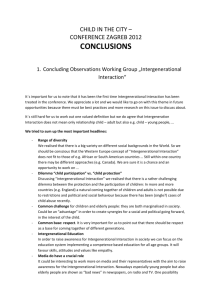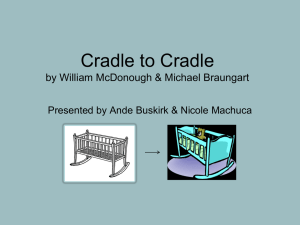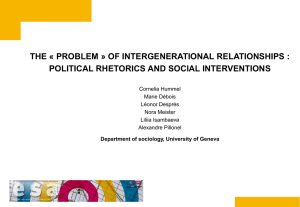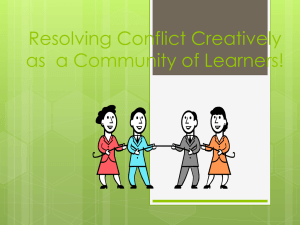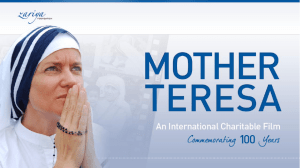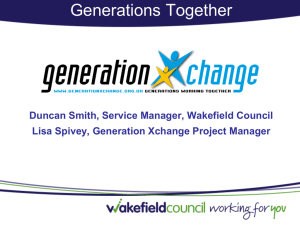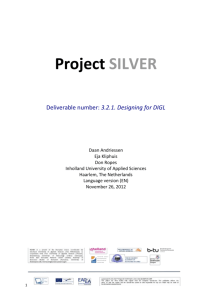Teresa Almeida Pinto, Association VIDA
advertisement
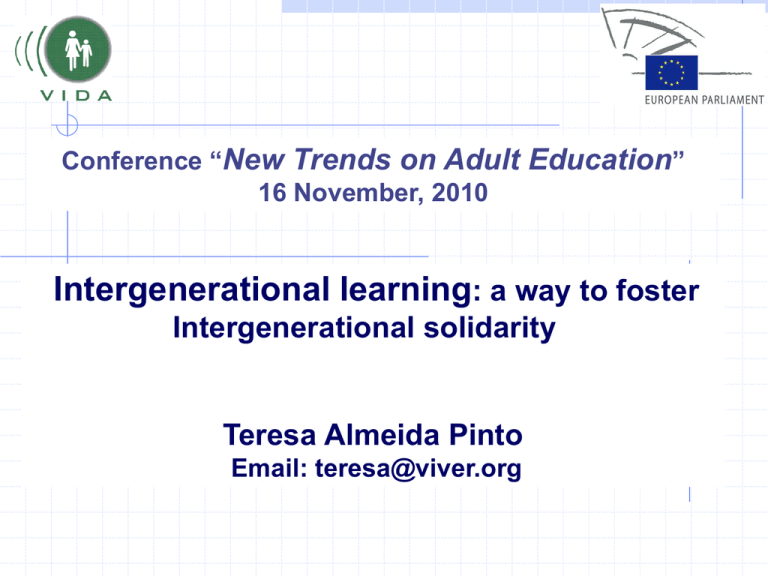
Conference “New Trends on Adult Education” 16 November, 2010 Intergenerational learning: a way to foster Intergenerational solidarity Teresa Almeida Pinto Email: teresa@viver.org Teresa Almeida Pinto | teresa@viver.org 1.Reflection: why mature and older people do not participate in LLL? 2. Results from the inquiry in the registration Form 3. Intergerational learning: a way to foster Intergenerational solidarity Teresa Almeida Pinto | teresa@viver.org Currently EU27 has 141 millions of inhabitants aged between 50 and 70 years old, but only 6,5 millions participate in education or training activities Source: Eurostat, 2010 Reasons of participation in non-formal education and training UK, SE and HU (2008) 35 and 54 years 80 70 60 50 40 30 20 10 0 UK SE HU To b eo To i nc rea s To d oj et To o bta To i nc rea To s t ar To m ee To b el es sl o s w e e w ert nb ett w ike l p e no er i o p d to f u ly i s e ge ca sin wl si b o a pa to p n t / ed e sk e l d i los e rtic l s i / t g i o s i o l e l e r ej s ipa f ju so / i s m u ob k s te st pro fg ills efu f o e ve o.. r fu l i. tt. . ... .. . . n Source: Eurostat AES, 2008 bli ge d ek ob b To g kn in c to tn Teresa Almeida Pinto | teresa@viver.org Participation of low-skilled and older persons (50-64) in lifelong learning, 2007 (%) Source: Eurostat, EU labour force survey (LFS), 2007, date of extraction: May 2008 Teresa Almeida Pinto | teresa@viver.org we learn trough informal or even accidental means, all sort of subjects. Learning everyday it’s as natural as breading every minute. Source: Eurostat, EU labour force survey (LFS), 2007, date of extraction: May 2008 how people can transform their every day informal and accidental learning in to a valuable asset, not only to themselves but also to society? What kind of skills mature and older people, should develop? Madonna, 51 years Education and training Programmes, for mature and older adults, should be focused on improving their. Strongly agree Disagree Professional 29% 16% Linguistic 24% 14% Intercultural 43% 7% Learning to learn 45% 7% Competencies: Participants in the Conference “New Trends on Adult Education”: 179 ansewers received, 153 validated Source: Next generation of Education and training Programmes, for mature and older adults, should pay more attention to: Mentoring and Befriending Intergenerational Learning Self-directed Learning Community based learning Strongly agree Disagree 32% 9% 47% 5% 31% 11% 31% 7% Participants in the Conference “New Trends on Adult Education”: 179 ansewers received, 153 validated Source: The primary objectives of Education and Training Programmes should be: Strongly agree Disagree Promoting equity, social cohesion and active citizenship Enhancing creativity and innovation, including entrepreneurship Improving mobility and professional exchange 61% 1% 50% 4% 35% 5% Recognition of prior learning 33% 9% Intergerational learning: a way to foster Intergenerational solidarity 2020 Strategy become more green, for the sake of the planet become more solidary, for the sake of humankind How to create solide links between generations? Intergerational learning: a way to foster Intergenerational solidarity Intergenerational Activities Intergenerational Learning Source: Eurostat, EU labour force survey (LFS), 2007, date of extraction: May 2008 Intergerational learning: a way to foster Intergenerational solidarity Intergenerational Activities (involve some degree of learning, but usually learning it’s not the central focus) how can we take advantage from the know-how and success of intergenerational activities and incorporate it’s principles into education? Source: Eurostat, EU labour force survey (LFS), 2007, date of extraction: May 2008 Teresa Almeida Pinto | teresa@viver.org How generations can learn and evolve together? Promote: Intergenerational learning as an academic discipline Active intergenerational learning, at local level Source: Eurostat, EU labour force survey (LFS), 2007, date of extraction: May 2008 Intergenerational learning as an academic discipline How prepared are the current professionals, to design transports, houses or daily objects, to older people? How Prepared are university teachers to have in their class rooms, students, not only younger than them, but also oldest ones? Is it the same to a lawyer or a psychologist, when they address to older people, or to young, adult people? Intergenerational learning as an academic discipline We need to define standards, equalize terms, identify and elect methods, procedures, and above all, re-organize the concept and the model Active intergenerational learning, at local level WHO Concept of Age Friendly Cities Learning across life-span Intergenerational Learning at local level Active intergenerational learning, at local level Companies, social institutions and local municipalities, are the better equipped to conduct regional projects, tailored to the real need of their citizens. Older people need to express their willing to keep contribute to society, regardless to their age, skills and socio-economic background. Active intergenerational learning, at local level Here some examples: Elders learning from youngsters, other subjects besides ICT or languages; Intergenerational entrepreneurship and selfemployment shared between young and elders; Knowledge sharing in the workplace; Intergenerational partnerships between younger and the older family business owners or managers, near retirement and without available biological family to succeed; Source: MATES Project THANK YOU ! Teresa Almeida Pinto Contact: teresa@viver.org
